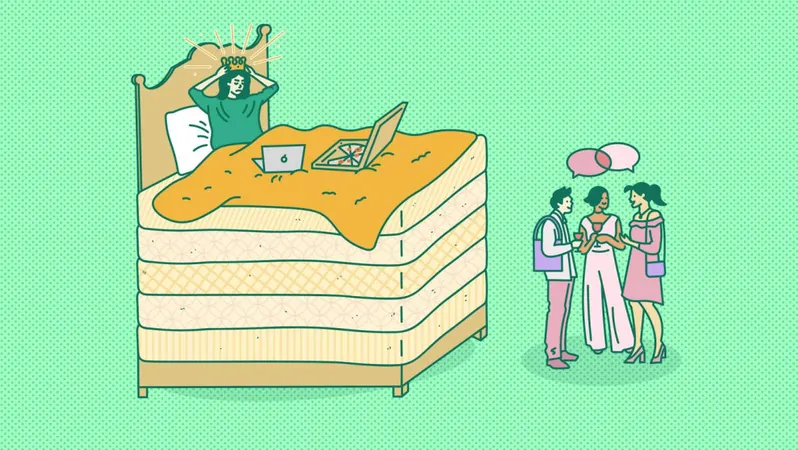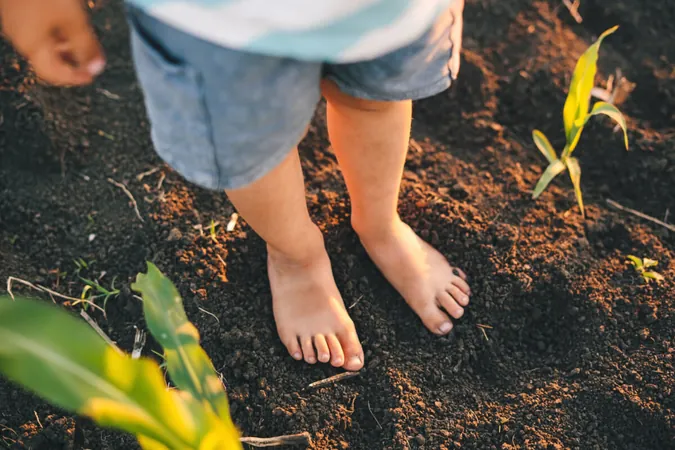
Beware the Polarizing Trend of Bed Rotting: Is It Truly Self-Care or a Trap?
2024-12-21
Author: Jia
Introduction
The once-popular debate of introversion versus extroversion has taken a surprising turn in recent years, largely influenced by the pandemic and the rise of social media culture. The publication of Susan Cain's groundbreaking book *Quiet: The Power of Introverts in a World That Can't Stop Talking* in 2012 initiated a profound shift in how society views introverts. It validated the quiet, thoughtful nature of introverts and highlighted their strengths in a world that often values vocality over substance. However, the pendulum of social perception has swung, and now extroverted individuals find themselves facing judgment and labeling.
The Emergence of Bed Rotting
In a cultural landscape where productivity has traditionally been seen as paramount, the idea of "bed rotting" has emerged as a dominant trend. But what exactly is bed rotting? It describes the act of staying in bed for prolonged periods engaged in passive activities—think binge-watching series or mindlessly scrolling through social media. Proponents of this trend view it as an essential act of self-care, a way to decompress from the stresses of life, and a form of resistance against hyper-productivity.
The Dark Side of Bed Rotting
But is it truly a healthy form of self-care, or can it lead to deeper issues? Mental health professionals warn that excessive bed rest may indicate underlying problems such as anxiety or depression. Bed rotting can provide temporary relief but can easily morph into a troubling pattern of behavior marked by isolation.
Social Media's Role
The conversation has now shifted on platforms like TikTok, with a culture that celebrates retreating into solitude for self-care while simultaneously shaming social engagement. Viral posts and videos glorify activities that champion staying in rather than partying or socializing, creating a divisive language around mental well-being. As clinical psychologist Dr. Ong Mianli notes, social media's focus on binary opinions—where rest is viewed as inherently superior to social interaction—can foster unnecessary rivalries and misunderstandings.
Pandemic Influences
The pandemic has also amplified this cultural shift, as lockdowns forced many into isolation, changing how we view solitude and moments of rest. Many began to find comfort in online communities that echoed their sentiments, often conflating isolation with healing and normalizing behaviors that may carry significant risks.
Finding Balance
Psychologists emphasize that while taking time to rest is critical, it becomes dangerous when such actions foster avoidance and disconnection from daily responsibilities. Dr. Annabelle Chow highlights that when bed rotting occurs frequently, it may develop into a pattern of behavior that reflects a deeper struggle, rather than restorative self-care.
The Extremes of Hustle Culture vs. Bed Rotting
A concerning aspect of this trend is how the extremes of hustle culture—the idea that constant productivity is essential—clash with the emerging culture of bed rotting, which posits rest as a form of rebellion. Both extremes can lead individuals to neglect the balance necessary for holistic mental well-being.
Conclusion
As we navigate this societal paradigm, it is crucial to recognize that rest and active engagement are not opposing forces but can coexist harmoniously. The acceptance of solitude and rest can be refreshing, yet we must be vigilant not to lose sight of social connections, which significantly enrich our lives. The wisdom lies in creating a nuanced understanding of self-care that includes both restful practices and meaningful connections.
So, is bed rotting empowering, or is it a slippery slope toward isolation? Only time will reveal the long-term effects of this trend, but the dialogue surrounding it continues to evolve. Choosing periods of rest is beneficial, but it’s vital to keep the world outside your bedroom door open, lest we mistake a preference for a principle—undermining not just our mental health but also our sense of belonging in the vibrant world around us.


 Brasil (PT)
Brasil (PT)
 Canada (EN)
Canada (EN)
 Chile (ES)
Chile (ES)
 España (ES)
España (ES)
 France (FR)
France (FR)
 Hong Kong (EN)
Hong Kong (EN)
 Italia (IT)
Italia (IT)
 日本 (JA)
日本 (JA)
 Magyarország (HU)
Magyarország (HU)
 Norge (NO)
Norge (NO)
 Polska (PL)
Polska (PL)
 Schweiz (DE)
Schweiz (DE)
 Singapore (EN)
Singapore (EN)
 Sverige (SV)
Sverige (SV)
 Suomi (FI)
Suomi (FI)
 Türkiye (TR)
Türkiye (TR)